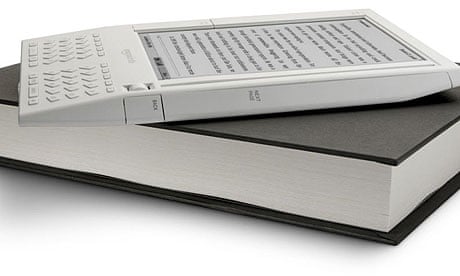In the early 90s, I made a pilgrimage to Boulder, Colorado, where the Knight Ridder chain of newspapers had established a research lab to contemplate the future of newspapers. It was rumoured that they were developing a "tablet" - that is, a portable screen about the size and weight of a paperback - on which people would in future be able to consume their news.
The rumour turned out to be loosely true, though, disappointingly, the "tablet" was made of wood, or possibly polythene. Full marks for futurology, though I seem to remember that the research lab was wound up shortly after my visit. Around 14 years later I got my hands on the real thing - the Amazon Kindle, an ebook more or less exactly as the Knight Ridder boffins had imagined it (though, disappointingly, not made of wood).
This is the third such real-life ebook I've now tried. The first was the iRex Iliad, the second the Sony Reader. I keep buying them because no editor wants to be like a generation of music industry executives who woke up one morning to find the iPod had eaten their business. That, and because I'm a sucker for gadgets in general.
I don't think the Kindle is quite the iPod moment for newspapers, but even so, it is pretty cute. The Sony Reader is leather-bound, stylish, sleek and rather grown-up. The Kindle, meanwhile, cast in white plastic, looks more like a toy, though it comes in a mock-leather wallet about the size, shape and weight of a Moleskine notebook.
In America the gadget is hooked up to the EVDO high-speed data network, whatever that is. Downloading books from Amazon using one-click settings is child's play. Leave it on overnight and the New York Times, Le Monde, the Irish Times or Frankfurter Allgemeine (but not - yet - the Guardian) will (for $9.99 a month) be waiting for you in the morning.
In Britain, it's a little more complicated. Actually, it's quite a bit more complicated. You have to buy the machine in the US, and can register for an Amazon Kindle account only if you can supply a US billing and credit card address. It won't work on any European network, but you can get round that by hooking it up to a laptop via a USB cable.
Until Amazon decides to take an interest in Europe, only a few gadget junkies are going to bother to go to these lengths. Which is a shame, because the Kindle is really rather lovely. The black-and-white screen is as close to reading print on paper as anything I've yet come across. And even in Europe, a book takes all of 20 seconds to download and sync. Changing font size, making notes and clipping bits of text are all pretty simple. Page-turning is fast. The controls are rather more intuitive than the Sony. And battery life is impressive.
The machine costs $399, which is not cheap. On the other hand, there is a staggering amount of literature now available from sites such as Project Gutenberg. At manybooks.net there are hundreds of out-of-copyright books ready formatted for the Kindle. All free.
Amazon promises that the Kindle will hold 160 full-length books, so your suitcase is going to be a good deal lighter in future. Before going on a piano course in France last year, I downloaded 40 or so music scores (nearly all of them from free open-source websites) in pdf form on to my Iliad, which made staggering to the hire car much less of a burden. I can't yet work out if the Kindle accepts pdf files - and, in any event, the screen is probably a little too small for musical scores - but, at worst, that means packing two small ebooks for the journey rather than a tonne of dusty old scores.
The Kindle is not very web-friendly: the screen lacks the colour and gorgeous, tactile playfulness of the iPhone. It would be more useful if it did more. But, all the same, it's a shame the Amazonians have left Europe as an afterthought. Here's hoping it works here one day.
· As a result of sustaining a break, Stephen Fry is taking a break. A broken right arm will take a few months to mend, and he will resume Dork Talk as soon as he can.

